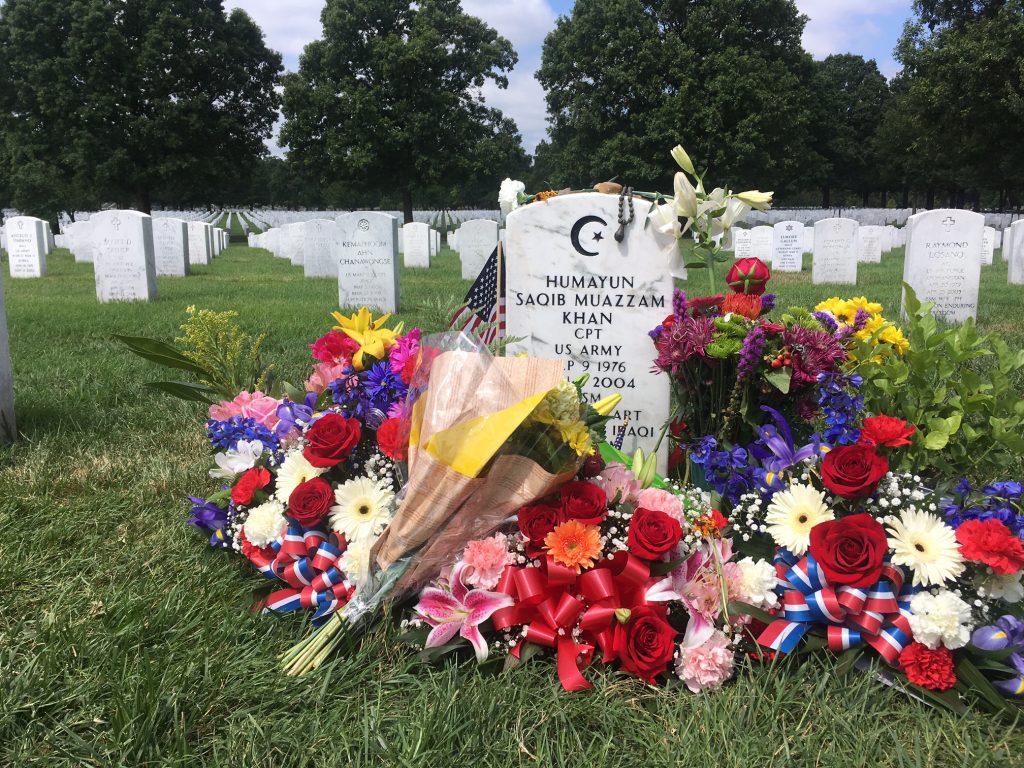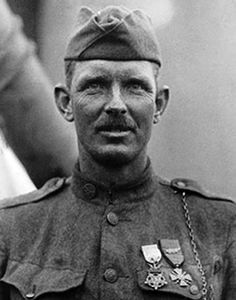Like millions of other Americans, I have been moved by the story of Humayun Khan, the U.S. Army captain who ordered the men and women under his command to “hit the ground” when a taxi packed with improvised explosive devices came barreling toward the main gate of a U.S. base in Baquba, Iraq. Captain Khan didn’t flinch. He walked toward the vehicle, motioning the driver to stop. A makeshift bomb inside the taxi exploded, instantly killing Captain Khan and two Iraqi civilians. On June 8, 2004 his bravery and swift thinking saved hundreds of lives. I read that a month earlier, on May 9, Humayan had called his mother to send her love and wish her a Happy Mother’s Day.
May 9 happens to be my birthday. I’m also a mother to three children and a proud daughter of a retired U.S. Marine.

The author, Alexis Lumbard (baby to the right) with her family and military father. Copyright Alexis York Lumbard
I felt a deep motivation to visit Captain Khan’s grave and pray for him, and in that process, discovered a story of my own that I hope to share.
So, a few days ago, I rode the metro to Arlington National Cemetery.
With a map in hand I leisurely walked along Eisenhower Drive, enjoying the views. Arlington National Cemetery is a sobering yet beautiful landmark — a sea of identical, white tombstones where 400,000 service men and women have been laid to rest on the grassy hills of Confederate General Robert E. Lee’s historic lawn. Established just after the Civil War, the graveyard served, initially, as a fat, middle finger to those who sided with injustice and division over peace and unity. While the country’s bloodiest war had several causes, the most central issue was slavery and the struggle to realize the full humanity of all of its citizens.
This trip was my first visit to the cemetery since childhood. But this time was different, more, surreal.
The bright sun felt warm, but remarkably comfortable for a midsummer’s day. The map led me past several streets, which serve as arteries to various sections of the sprawling 624-acre park: Roosevelt Drive, King Drive, Leahy, and McClellen.
At the following crossroad I turned left onto York Drive.

Alexis York Lumbard at the intersection of York Ave and Eisenhower Drive.
York is my maiden and family name. Sergeant Alvin C. York, for whom the Drive is named, is one of the most venerated WWI heroes. My grandfather, who served alongside his brothers in WWII spoke often of this famous soldier.
Captain Khan is buried off York Drive in section 60 plot 7986.
As I approached his grave, I paused. In the sea of white a single grave caught my eye. Dozens of bright flowers. A splash of life. Muslim prayer beads. There lies his grave.

copyright Alexis York Lumbard
I knelt down and offered a prayer, feeling a deep connection to Captain Khan. Perhaps because I, too, am Muslim.
I converted to Islam in 2001, a couple months prior to the tragedy of September 11. My family is nominally Protestant, but embracing Islam was for me a deeply personal and spiritual experience. My conversion was neither a rejection of Christianity nor a rejection of my past. Rather, it was simply a process of discovery and my journey toward the Creator of all faiths. And while Islam has opened my eyes to the beauty of other cultures, it has in no way distanced me from my own. I’m proud of my deep American roots and the many generations of Yorks who have fought and struggled as dirt, poor farmers and in the military since the time of the Revolutionary War.

copyright Alexis York Lumbard
Were my parents a bit bewildered, perhaps, even concerned?
Maybe, you’d have to ask them. But we’re a family and we love each other. In the end, my conversion brought us closer together because it brought me closer to my real self — or at least the self I wanted to be.
I married an academic, also a convert to Islam, and we moved to Egypt and then to Jordan where he was offered his first academic position. But the United States of America remained our home and after the birth of our first daughter, my husband accepted a position at a reputable university in the Boston area. We lived there for nearly 10 years. We bought a home, volunteered in the community and joined interfaith events. We hoped to build bridges and continue our good work. But as the Yiddish saying goes, “Man plans and God laughs.”
After nearly a decade, we moved to Sharjah where my husband accepted a position at the American University. Sharjah is one of the seven Emirates of the United Arab Emirates (UAE), a sister state to Dubai, where Captain Khan was born.
Certainly, the world feels small and shrinking day by day.
Meanwhile, as I sat in front of Captain Khan’s grave reciting Surah al-Fatihah and Surah Ya-Sin, the tears came streaming down. All around me were the graves of brave men and women whose birth dates mirrored my own. A field of my peers. Crosses. Stars of David. Crescent moons.

copyright Alexis York Lumbard
I thought of my new neighbors in the UAE, some of whom are Iraqi. I pondered their stories, their pain and the lingering after effects of war upon war, which now consumes much of the Middle East.
Unfortunately, for some, man plans and God weeps.
I prayed for light and mercy, not only for Captain Khan, but also his family. A parent never recovers from the loss of a child. Yet there stood at the Democratic National Convention, Khizr and Ghazala Khan, Captain Humayun’s parents, adding more substance and dignity to the conversation of our nation’s future with their words and silence. I cannot imagine how it must feel to be held under the national spotlight while still in the throes of grief.
As I left the cemetery that day, I called my dad to thank him for sending me the map. I told him I was glad that he wanted to be buried in Arlington Cemetery and I had hoped there would still be a spot for him (as I couldn’t think of a more beautiful location) and that, at that moment, I happened to be standing on York Ave. “You know that’s a relative of yours,” my father said. “Wait?” I said, “Is that the same York that Grandpa often spoke of?”
I thought it had been just a coincidence. After all, York is a common name.
“Yes,” continued my father. “In a very distant way we’re related to Sergeant Alvin C. York. Look him up.”
Back on the subway I did just that.
****
Captain Khan, I’d like you to meet Sergeant York. He was a hero, just like you, though he wasn’t, at first, so resolute. He was a conscientious objector. But in 1917, such exemptions were not allowed. He was drafted and sent to war. His skills as a sharp shooter were well known and one rainy French morning he and his company found themselves behind enemy lines, completely exposed to German machine gunners. His best friend soon died. Like you, he didn’t flinch. He led an attack that took down nine German gunners, saving the lives of countless men. In the end, 132 German soldiers were captured and escorted as prisoners to nearby Varennes.

Sergeant Alvin York
Sergeant York isn’t buried in Arlington National Cemetery. He is buried in Tennessee. He survived the war, married and had kids. This you sadly do not share. But you share the bond of serving in the United States Army. You share the bond of brotherhood, valor and honor. And in this way, I feel remarkably connected to both of you. You, Captain Khan, for somehow giving back to America, even 12 years after your death. You have done more to represent the goodness and strength of American Muslims than I could ever dream of doing. And to you, Sergeant York, for allowing me to maintain your name, a name that has honored my family from the earliest of times. You are both representative of me, as a person from many generations of Americans, and a person choosing to be Muslim, too. And there are countless like me as well in this country.
Sergeant York once said that “the fear of God makes one a hero; the fear of man makes a coward.”
We should all learn to follow the examples of Sergeant York and Captain Khan. From them we can learn to act when we must and object when we must. And to choose the fear of God over the fear of man– for fear makes strangers of those who should be friends.
Aren’t we, after all, but one family?









